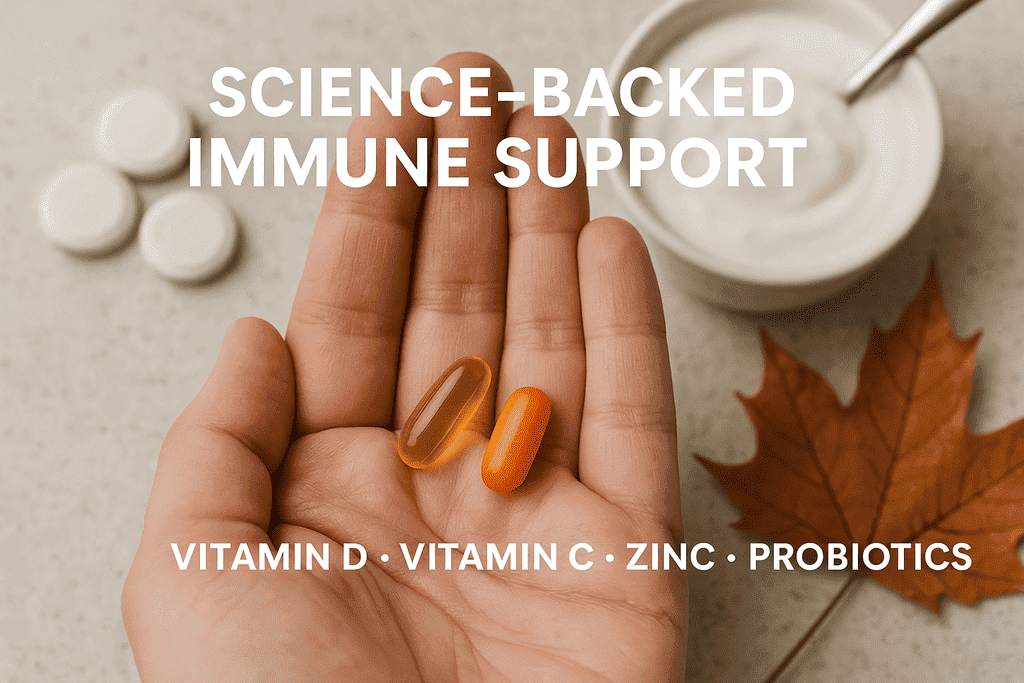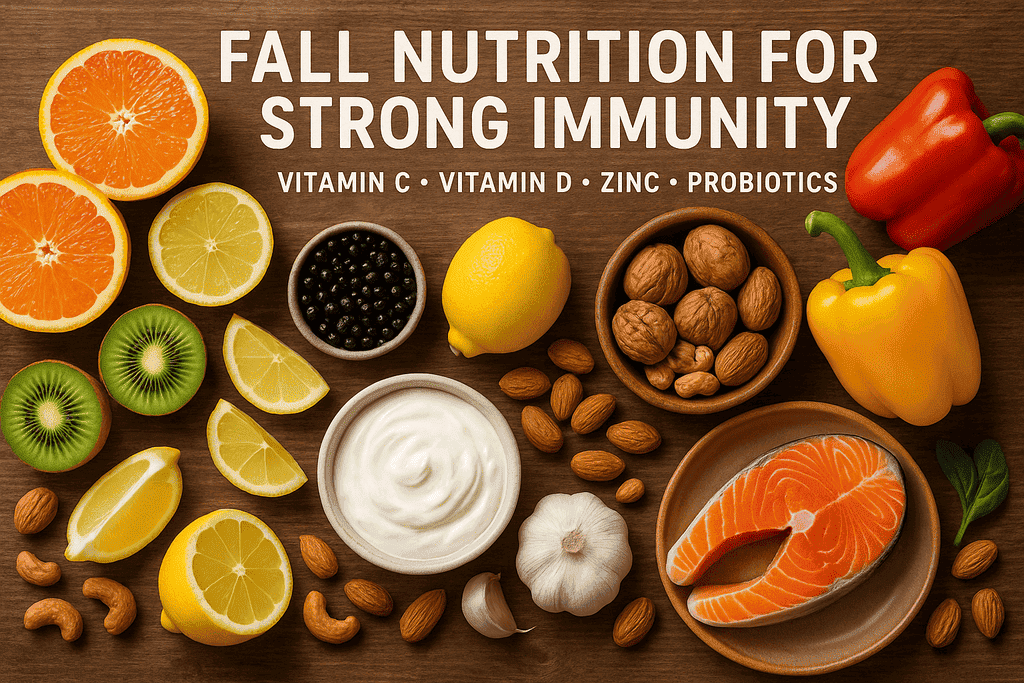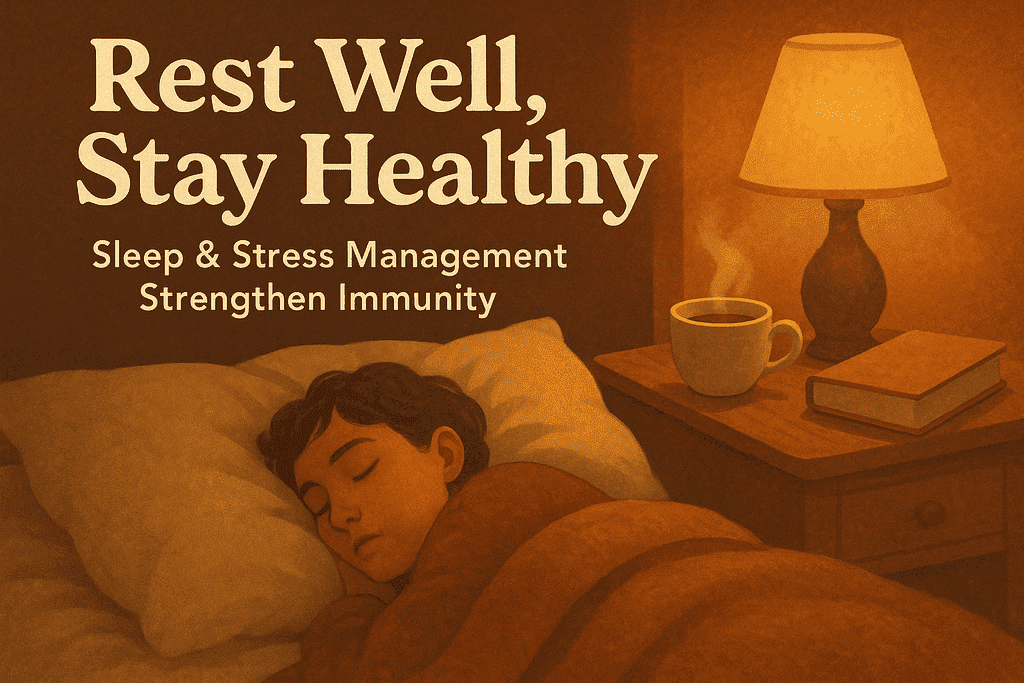
Introduction
As the air cools and daylight shortens, autumn ushers in cozy sweaters, warm soups—and a higher risk of colds, flus, and other respiratory infections. Strengthening your immune system naturally in the fall is both sensible and achievable. This evidence-based guide describes clear, practical strategies—rooted in nutrition, lifestyle, and validated supplements—to support immune resilience. It uses SEO-friendly language (e.g., immune support, natural immunity, vitamin D and immunity, probiotics for immune health, sleep and immunity) and cites modern scientific and medical studies so readers and search engines can trust the content.
Main Points (at a glance)
- Sleep and stress management are foundational: chronic poor sleep weakens immune responses. PMC+1
- Regular moderate exercise enhances immune surveillance, but extreme overtraining can suppress immunity. PMC
- Vitamin D status strongly influences respiratory infection risk; supplementing people with low levels reduces acute respiratory infections in RCTs. PubMed+1
- Micronutrients—vitamin C, zinc, and selenium—play measurable roles in infection resistance and recovery. BioMed Central+1
- Probiotics and fermented foods modulate mucosal immunity and can lower respiratory infection severity in some trials. PMC+1
- Herbal supports such as elderberry show promising results for shortening upper respiratory symptoms, but quality and dosing vary. NCCIH

The Body — Natural Strategies Backed by Science
1. Prioritize Quality Sleep and Manage Stress
Sleep is not optional for immune health. Poor or short sleep disrupts cytokine balance and reduces vaccine responses and pathogen defense. Aim for 7–9 hours nightly, maintain a consistent sleep schedule, and adopt sleep hygiene (cool, dark room; limit screens before bed). Behavioral methods like mindfulness, deep breathing, and progressive muscle relaxation reduce stress hormones (cortisol), which otherwise blunt immune function. Large reviews summarize the sleep–immune crosstalk and recommend sleep optimization as a public-health strategy. PMC+1
Practical tips: nightly wind-down routine, limit caffeine after 2 PM, use blue-light filters in the evening.
2. Move Regularly — Prefer Moderate, Consistent Exercise
Moderate aerobic exercise (brisk walking, cycling, swimming) 30–60 minutes most days improves circulation of immune cells, reduces chronic inflammation, and supports vaccine response. However, prolonged high-intensity training without adequate recovery can transiently suppress immunity—so balance is key. Clinical reviews and research articles confirm exercise’s role as a nonpharmacologic immune booster. PMC+1
Practical tips: aim for 150 minutes/week moderate-intensity, include strength training 2× weekly, prioritize recovery days.

3. Optimize Nutrition : Whole Foods First
A balanced, nutrient-dense diet is the backbone of immune support. Key principles:
- Emphasize vegetables, fruits, whole grains, legumes, nuts, and lean proteins to deliver micronutrients and fiber.
- Ensure daily sources of vitamin C (bell peppers, citrus, kiwi), vitamin A precursors (orange/yellow veggies), zinc (pumpkin seeds, legumes, lean meat), and selenium (Brazil nuts).
- Include omega-3 fats (fatty fish, flaxseed) to moderate inflammation.
Malnutrition and even subclinical micronutrient shortfalls increase susceptibility to infections; global nutrition reports highlight the public-health importance of food security and dietary quality. Global Nutrition Report+1
4. Targeted Supplements with Clinical Evidence
Vitamin D — One of the most consistently supported supplements for respiratory infection prevention. Large meta-analyses of randomized trials show that correcting deficiency lowers the risk of acute respiratory infections, particularly when baseline levels are low and dosing is moderate (daily/weekly rather than large, infrequent boluses). Get a blood 25(OH)D test if uncertain and consult a healthcare provider for dosing. PubMed+1
Vitamin C — Regular supplementation shortens the duration of common colds in trials and may reduce symptom severity in some cases; it’s less effective as a one-time therapeutic after symptoms start. Typical supplemental ranges used in studies: 200–1,000 mg/day. BioMed Central+1
Zinc — Oral zinc (particularly lozenges started early in a cold) has evidence for reducing duration and severity of colds; prophylactic zinc reduces incidence in some populations. Be cautious with long-term high-dose zinc (can affect copper levels). PMC+1
Probiotics — Specific strains (e.g., certain Lactobacillus and Bifidobacterium strains) have been associated with reduced upper respiratory tract infection incidence and improved immune markers in meta-analyses. Choose clinically studied strains and follow product labeling. Frontiers+1
Elderberry (Sambucus nigra) — Several randomized trials and meta-analyses suggest elderberry extracts can shorten upper respiratory symptoms and reduce severity, but product variation is an issue. Regulatory bodies recommend quality-controlled preparations and consultation with a clinician if on other medications. NCCIH+1
5. Gut Health and Fermented Foods
The gut–immune axis plays a central role in mucosal immunity. Fermented foods (yogurt, kefir, sauerkraut, kimchi) and prebiotic fiber help sustain a diverse microbiome and support secretory IgA production in the respiratory tract. Multiple clinical studies show probiotic supplementation modulates cytokines and may reduce infection burden in at-risk populations (children, athletes). PMC+1
6. Hydration, Hygiene, and Environmental Measures
Stay hydrated (supports mucosal barriers), continue practical infection control during peaks (hand hygiene, stay home when ill), and improve indoor air quality (ventilation, HEPA filters where appropriate). Seasonal humidity affects mucosal defenses; using a humidifier in dry heating months can preserve nasal mucosal integrity.

Table — Natural Methods, Evidence Level, Quick Actions
| Natural Method | Evidence Level (research) | Quick Action (Fall-ready) |
|---|---|---|
| Vitamin D supplementation | High (meta-analyses of RCTs) PubMed | Check 25(OH)D; supplement if low (consult doctor) |
| Sleep & Stress management | High (reviews) PMC | 7–9 hrs/night; sleep routine; mindfulness |
| Moderate Exercise | Moderate–High (reviews) PMC | 30–60 min/day moderate activity |
| Vitamin C | Moderate (meta-analyses) BioMed Central | 200–1000 mg/day may shorten colds |
| Zinc | Moderate (meta-analyses) PMC | Zinc lozenges early in symptoms; watch dosing |
| Probiotics / Fermented foods | Moderate (meta-analyses) Frontiers+1 | Daily fermented food or specific probiotic strains |
| Elderberry | Low–Moderate (RCTs & meta-analyses) NCCIH | Short courses during early cold symptoms; use quality extract |
Illustration Ideas (to accompany the article)
- Infographic: “Fall Immune Checklist” — a vertical checklist showing sleep, vitamin D sunlight icon, colorful plate for nutrition, walking shoes for exercise, a probiotic yogurt jar, and supplement bottles (labeled D, C, Zinc). Caption: “Natural steps to a stronger immune system this fall.”
- Table-style visual: an attractive table summarizing Supplements, Evidence, Dosage Guidance with icons and footnotes citing major studies.
- Diagram: a simple gut–lung axis diagram showing how probiotics and fiber influence mucosal immunity.
- Photo montage: cozy fall scene—family walking outdoors, bowl of vegetable soup, person sleeping peacefully—overlayed with short SEO phrases: “immune support,” “natural immunity,” “fall wellness.”
Conclusion
Autumn is an ideal time to strengthen immunity using natural, evidence-based methods. Prioritize sleep, stress reduction, balanced nutrition, and moderate exercise. Consider targeted supplements—vitamin D, vitamin C, zinc, and selected probiotics—especially when dietary intake or sun exposure is insufficient. Use elderberry cautiously as an adjunct for symptomatic relief. These measures, combined with sensible hygiene and environmental practices, create a resilient, multi-layered defense against seasonal respiratory illnesses.
Before beginning any new supplement regimen—especially if you have chronic health conditions, take medications, or are pregnant—consult your healthcare provider for personalized advice. The strategies above are supported by modern clinical and scientific research from major medical journals and public health organizations.
References (selected scientific & reputable sources)
- Jolliffe, D. A., et al. Vitamin D supplementation to prevent acute respiratory infections: systematic review and meta-analysis of randomized controlled trials. (Meta-analysis). PubMed
- Jordan, T., et al. COVID-19 and Vitamin D – A Systematic Review. PMC
- Garbarino, S., et al. Role of sleep deprivation in immune-related disease risk. (Review). PMC+1
- da Silveira, M. P., et al. Physical exercise as a tool to help the immune system. (Review). PMC
- Hemilä, H. Vitamin C for preventing and treating the common cold (Cochrane Review). Cochrane Library+1
- Hunter, J., et al. Zinc for the prevention or treatment of acute viral respiratory tract infections. (Review). PMC+1
- Guo, Y. T., et al. Effects of Probiotic Supplementation on Immune and Respiratory Outcomes. PMC+1
- National Center for Complementary and Integrative Health (NCCIH) — Elderberry: Usefulness and Safety (consumer information). NCCIH+1
- FAO / Global Nutrition Reports — State of Food Security and Nutrition (context on nutrition and public health). openknowledge.fao.org+1







